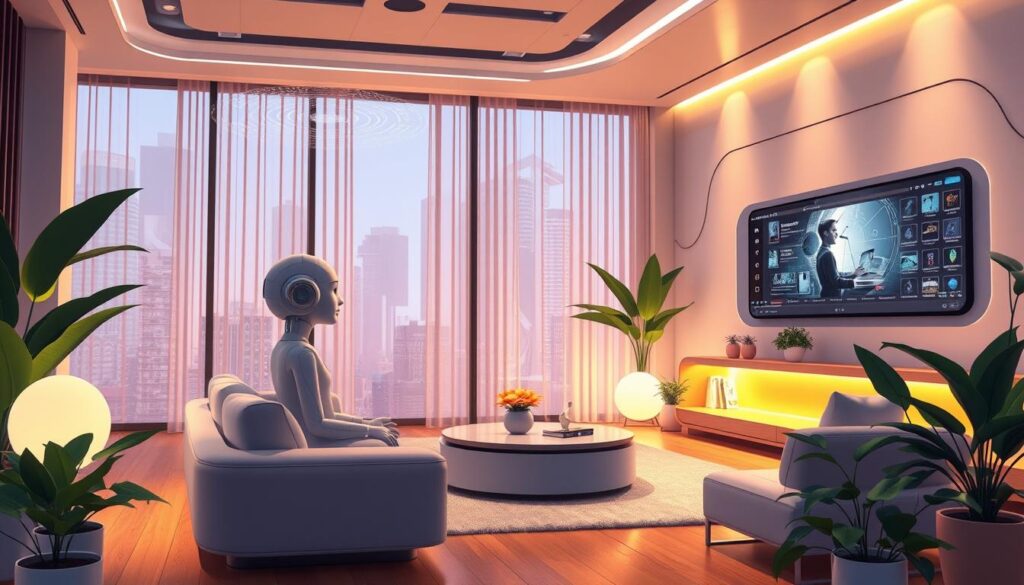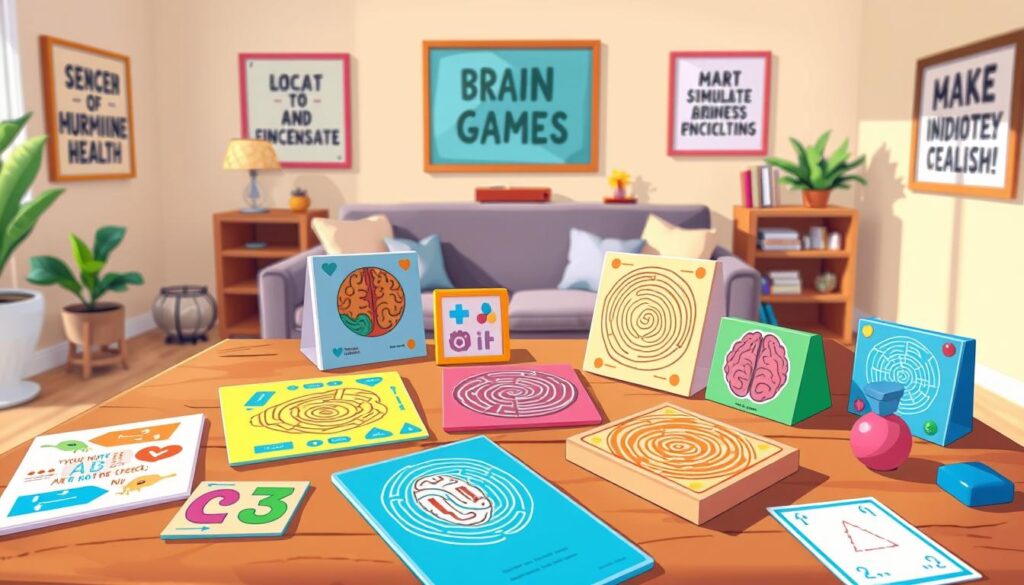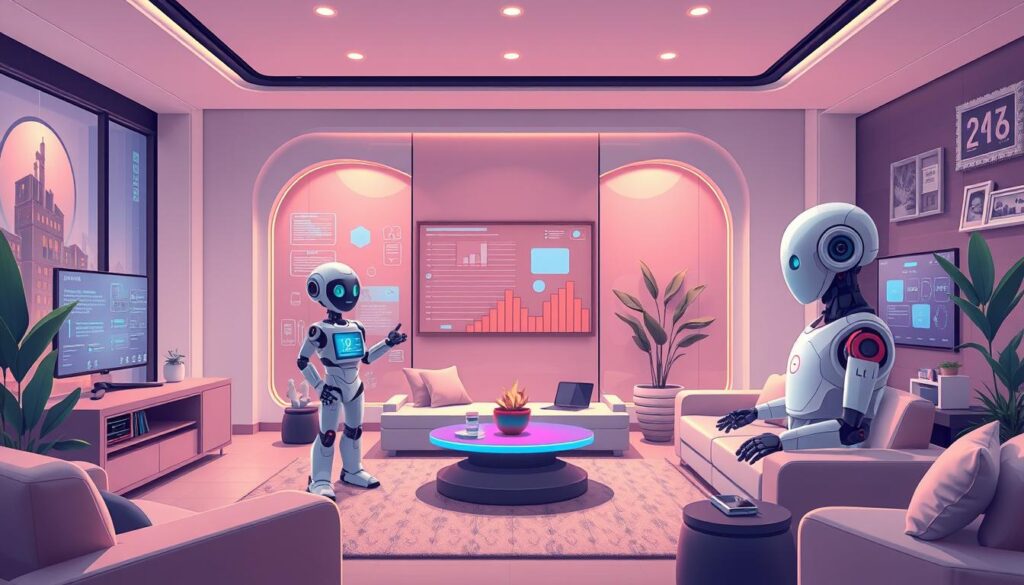Artificial intelligence is changing senior care, making life safer and more independent. As more people get older, AI is key to making life better for seniors. It helps with safety at home and keeps an eye on health.
AI-powered personal assistants are changing how seniors live. They use voice commands and ambient intelligence to make life easier. These smart friends can do many things, like control your home and help with daily tasks, keeping you independent.
These assistants talk like humans, understanding what you need. They can remind you of things, plan your day, or even chat with you. This is changing how seniors live at home.
AI-Based Health Monitoring and Alert Systems
Artificial intelligence is changing senior care by offering continuous health monitoring through smart devices. These devices track vital signs like heart rate and blood pressure. AI quickly checks this data for abnormalities that could mean health issues.
This quick check lets caregivers or doctors act fast. It might stop small problems from becoming big health crises.
This proactive approach keeps seniors safe and reassures their families. By using smart devices for senior care, healthcare can improve life quality for the elderly. It also helps prevent health crises before they start.
Continuous Monitoring of Vital Signs
AI-powered vital signs tracking technology lets healthcare providers keep a close eye on seniors. These systems collect real-time data on health indicators. This gives a full picture of someone’s health.
The AI can spot abnormalities and alert caregivers or doctors right away. This allows for quick action.
Prompt Alerts for Abnormalities
AI-based health monitoring quickly finds any abnormalities in vital signs or behavior. These systems use machine learning to know what’s normal for each person. Then, they alert caregivers quickly if something’s off.
This prompt alert system helps caregivers act fast. It might stop small issues from getting worse.
Proactive Approach for Preventing Health Crises
Using AI in senior care is a proactive way to handle health. It keeps track of someone’s health and spots abnormalities early. This can stop health crises before they start.
This not only makes life better for seniors but also eases the healthcare system. It cuts down on the need for emergency care.
Fall Detection and Prevention with AI
As we get older, falling becomes a big worry. It can lead to serious injuries and make seniors lose their independence. But, AI is changing how we keep seniors safe and let them live on their own. Now, AI can watch over seniors and predict when they might fall.
These sensors are in wearable devices or in the home. They look at how seniors move and spot sudden changes that could mean a fall. If a fall happens, the system quickly tells caregivers or emergency services, helping to prevent serious harm.
Advanced Sensor Technology for Fall Detection
The newest fall detection technology uses many sensors to watch over a person’s actions. These sensors can spot small changes in balance, walking, and standing. This lets the AI system know when someone might fall and act fast. With sensor-based fall prevention, seniors can stay independent and feel safer every day.
Predictive Analytics for Fall Risk Assessment
AI also uses predictive analytics for fall risk to look ahead. It checks data on how someone moves, their health, and their surroundings. This helps spot risks early and suggest ways to keep seniors safe and independent. This way, seniors and their caregivers can act early to prevent falls and keep life good.
AI-Powered Personal Assistants for Enriched Living
AI has made a big impact in our daily lives, especially with voice-enabled digital assistants like Amazon’s Alexa and Apple’s Siri. These ai-powered personal assistants use natural language processing (NLP) to understand and answer our speech. They make talking to devices easy and quick. By getting to know what we like and do, they offer personalized tips and help, making our lives better and keeping us safe and independent.
For small businesses, conversational ai technologies can make things run smoother and help them work better. Even if a business can’t afford a full-time assistant, AI tools for smart home automation and personalized task automation can save over 20 hours a month. This means more time for the important work. By using these ai-powered personal assistants, business owners can manage their time better, plan meals, and fix tech problems, making their workdays more organized.

The market for virtual AI assistants is set to hit USD 60.83 billion by 2029. Already, 84% of people use a voice-enabled digital assistant in some way. These conversational ai technologies are changing how businesses work, offering 24/7 help and nearly 80% of CEOs think they will change how we talk to customers and prospects.
Cognitive Health Tools Driven by AI
As we get older, keeping our brains healthy is key, especially for those at risk of dementia or Alzheimer’s. Luckily, AI-powered tools are changing how we keep our brains sharp and track our mental health.
These cognitive health tools feature brain-stimulating games and puzzles that adjust to your skill level. They challenge your brain with harder tasks over time. This keeps your mind quick and helps slow down mental decline. Playing these games regularly makes life better for seniors and keeps them independent longer.

Monitoring Cognitive Function Changes
These tools also help caregivers and doctors by tracking changes in mental health. By keeping an eye on how our brains change, they can adjust care plans. This ensures seniors get the right support to live well and prevent dementia.
Personalized Care Plans with AI
The number of seniors in the U.S. is growing fast, with over 20% expected to be 65 or older by 2030. This means we need more personalized, data-driven care than ever. Luckily, AI is changing how seniors get support for their health needs and likes.
AI looks at health monitor data, daily activities, and medical records to create care plans just for each person. This data-driven care helps caregivers make smart, early decisions. It makes sure seniors get the right help at the right time.
Data Analysis for Individualized Care
Predictive analytics for elder care let AI spot patterns and guess future health needs. This helps caregivers make care plans that fit each senior’s life. For example, AI might change a senior’s diet or exercise plan based on their activity levels and health signs. This makes ai-powered chronic condition management more effective.
Tailored Recommendations for Chronic Conditions
For seniors with chronic conditions, AI makes care plans super personal. It looks at a senior’s health history, symptoms, and how they react to treatments. Then, AI suggests the best ways to help, making sure personalized care plans meet each senior’s needs and likes.
Conclusion
Artificial Intelligence is changing the lives of seniors for the better. It helps them stay independent, safe, and engaged every day. With tools like health monitoring and personalized care plans, AI is making a big difference.
As technology gets better, we’ll see even more ways AI helps seniors. By using these new tools, we can make sure seniors live well. They’ll get support from smart, tailored, and proactive technologies that meet their needs.
Studies and trends show AI has a huge role in changing senior care. It can help older adults live full, independent lives. We must focus on making these technologies ethical, protecting user privacy, and making them easy to use. This way, they truly benefit the seniors they’re meant to help.
